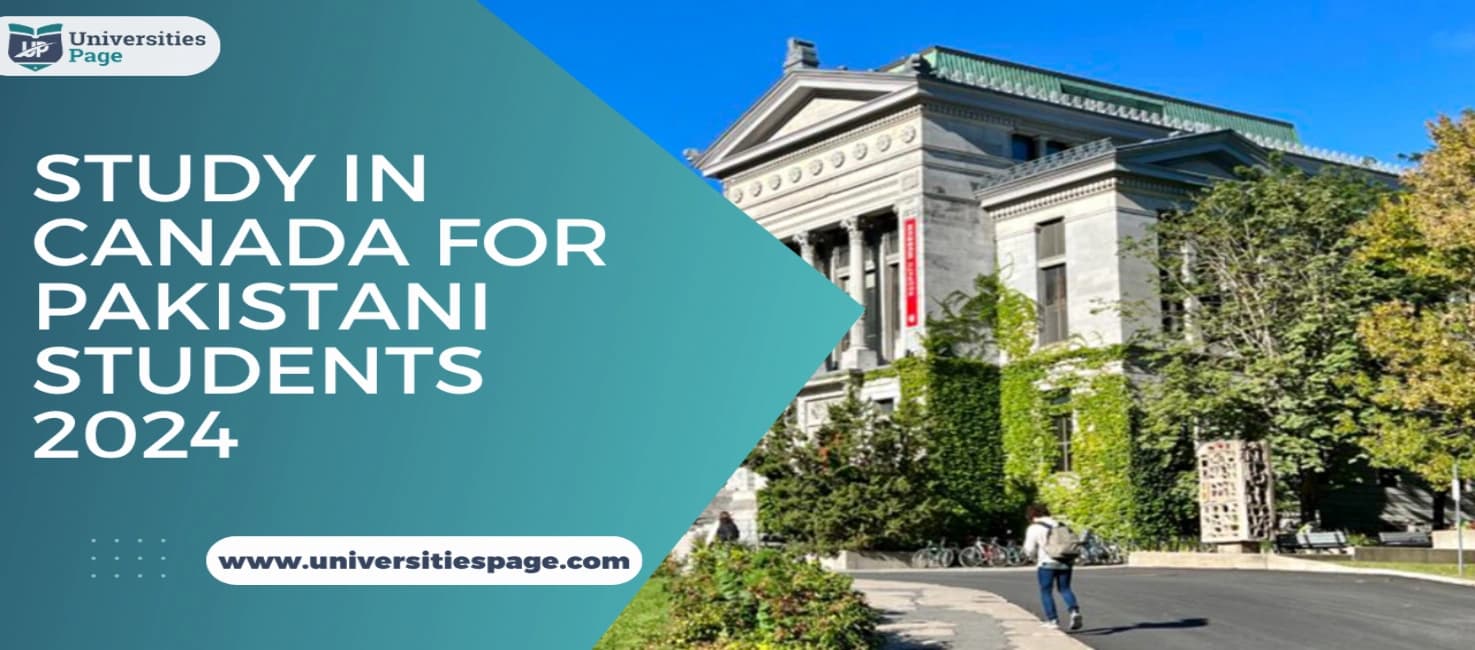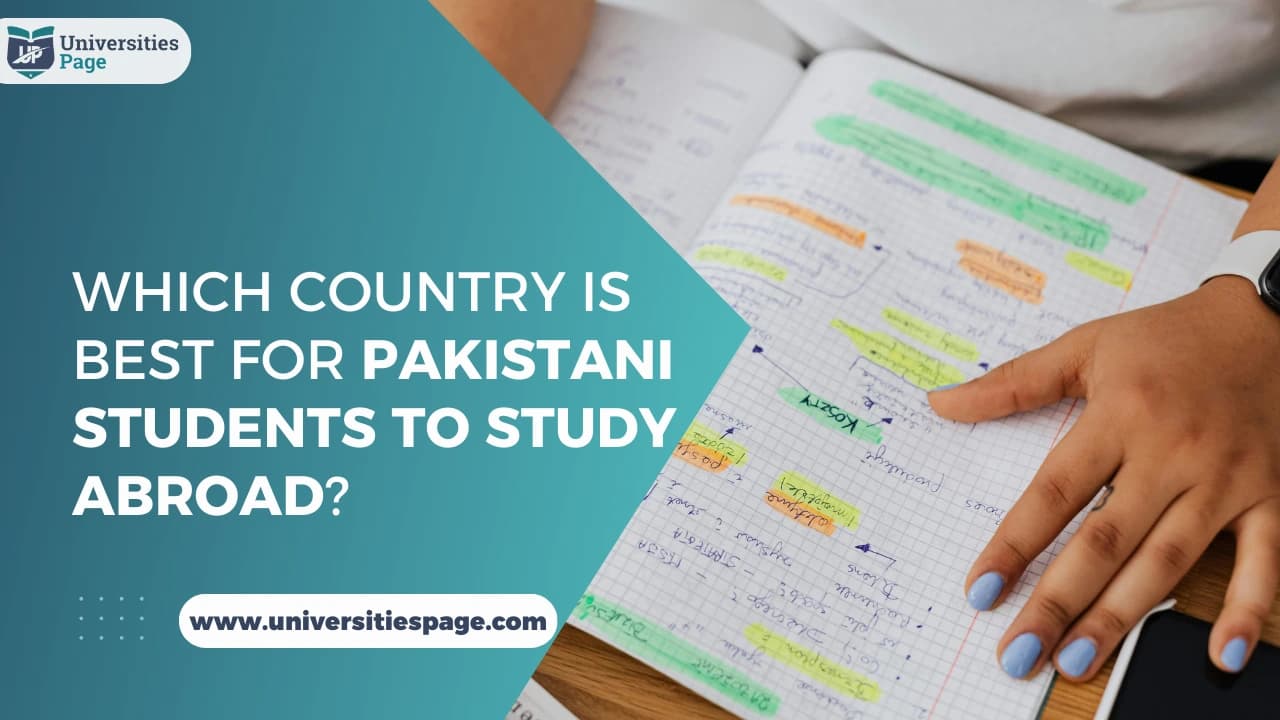Loading article...
Preparing your reading experience
Loading article...
Preparing your reading experience

Study in Canada is the dream of many Pakistani students.
Canada is one of the best countries in the world to pursue education for those
who want to study abroad. Although, many other countries in the world are
offering international education to Pakistani students the opportunities which
Canada is offering to its students are more desirable to the students who want
to study abroad.
Canada not only offers quality education to its students but also the students enjoy a quality life in Canada while studying, and explore Canadian culture after completing their education, Canada offers job opportunities to its students.
That is the reason more than 70,000 thousand
international students including many from Pakistan choose Canada as their
future destination for education. Later on, after completing their education
many find desirable opportunities in the Canadian job market and, therefore,
establish their professional careers in Canada as well.
Canada offers different degrees you can choose from, i.e. bachelor's, master's, and doctorate, programs including professional certifications in the relevant fields. If you're thinking about studying in Canada, Here's the guide that will get you covered, you must check it out.
|
Study in Canada for
Pakistani Students 2024 |
|
|
Teaching Language |
English and French |
|
Top Universities
in Moldova |
|
|
Course Duration |
Professional
certifications few weeks to several months program |
|
Minimum education required |
For Undergraduate
Programs (Bachelor's Degree): Completion of
secondary school or its equivalent, which is often 12 years of formal
education. For Graduate
Programs (Master's and Doctoral Degrees): Degree of Bachelor's
or its equal from a recognized institution for master's programs. For doctorate
programs, a master's degree or its equivalent is usually required. |
|
Average fee structure |
For international
undergraduate students $36,100 per year For international
graduate students $21,100 per year |
|
Is IELTS required or not? |
May or may not be
required |
|
Eligibility criteria |
Should be an
eligible/territory country citizen student (Pakistan is on the list of
eligible countries) Should have
completed 12 years of education |
|
Scholarships |
Yes, scholarships
are available. |
|
Part-time job Working hours |
20 hours per week |
|
After the study work permit |
Canada offers
multiple types of work permits to its students after completing their
education |
|
Embassy location
or Consulate office |
LDA complex, 2nd floor,
Jinnah Town, Lahore |
|
Bank statements |
May or may not be
required |
|
Average monthly expense |
1000-1200 CAD |
|
Admission processing time |
2-3 months |
|
Visa processing time |
A few weeks to a
couple of months |
Under the umbrella of Global
Affairs Canada’s international Scholarship Program, a scholarship named the
Study in Canada
Scholarship is offered to international students from a variety of
countries.it is a short-term research study, an exchange program basically to
improve opportunities for Canadian post-secondary institutions. Participants
across Europe, Asia Middle East, and Sub-Saharan Africa contest this
scholarship, and eligible; candidates
are selected on merits.
For college, undergraduate, and
graduate students, the program offers scholarships of varying amounts and
lengths. Eligible costs include living expenses, health insurance, flights,
visa fees, and more. Financial assistance is provided to Canadian educational
institutions to help with administrative expenses.
The selection criteria emphasize
the development of strong international connections while giving priority to
the merit and possible effect of the proposed study or research in Canada.
Canadian educational institutions have until March 19, 2024, to submit
applications. The results will be announced in the spring.
The 1973-established Canada-China
Scholars' Exchange Program (CCSEP) is a bilateral program that came about as a
consequence of cooperation between Canadian Prime Minister Pierre Elliott
Trudeau and Chinese Premier Zhou Enlai.
This official exchange program
facilitates professionals and scholars from China by giving exposure in Canada
through research experiences, typically lasting four to 12 months.
The scholarships are not tied to
formal enrollment at Canadian universities but involve placement as visiting
scholars.
Full-time, permanent teachers or
research officers, master's or doctorate graduates, and senior
non-academic professionals in China are eligible for this program.
This program enables recipients
to contribute in their relevant field after their return to China, which
fosters mutual understanding between the two nations. Fields i.e., public
health policy, law, economics, education, business management, and environmental
protection are preferred for this program.
The Canada-ASEAN Scholarships and
Educational Exchanges for Development (SEED) program, initiated by the
Government of Canada in 2017, facilitates short-term study or research
opportunities for students from ASEAN member states in Canadian post-secondary
institutions.
The alignment with the Agenda for
Sustainable Development 2023, SEED aims to contribute to poverty reduction and
achieve Sustainable Development Goals. The program strengthens people-to-people
ties between Canada and the Indo-Pacific region through student exchange
programs and collaboration of institutions.
Eligible candidates should have
citizenship of ASEAN member states, be registered permanently in a post-secondary
institute, and pay tuition fees. Scholarships cover various durations
and values for college, undergraduate, and graduate levels, including expenses
such as visa fees, airfare, health insurance, and living expenses.
Canadian institutions hosting
students receive funding, and the program is subject to the availability of
Government of Canada funding. The application process involves coordination
between Canadian and ASEAN institutions, and successful students must adhere to
scholarship conditions, returning to their home institutions after the program.
In honor of Major-General Georges
P. Vanier, the nation's first francophone governor general, the Vanier Canada
Graduate Scholarships (Vanier CGS) program seeks to draw exceptionally talented
doctorate candidates to Canadian universities.
Three equally weighted selection
factors are taken into consideration by the program which is valued at $50,000
per year for three years of Ph.D. studies:
Results for the Vanier Scholars 2023 are expected to be released in the middle of April 2024. Candidates may only seek a nomination from the university where they plan to study, and they must be nominated by a quota-holding Canadian institution to be eligible. The scholarship is granted to foreign nationals, citizens of Canada, and permanent inhabitants of Canada whose fields of study include engineering, the natural sciences, and/or health.
|
World
Ranking |
54 |
|
IELTS
required or not |
Yes |
|
Average
tuition fee |
15000
CAD |
|
Acceptance
rate |
38% |
The University of Alberta,
situated in Edmonton, Canada, is a leading research-intensive institution known
for its academic excellence and innovation. Offering a wide array of
undergraduate and graduate programs, the university fosters a dynamic learning
environment. Renowned for impactful research and a commitment to community
engagement, the University of Alberta is a distinguished academic hub in
Canada.
|
World Ranking |
136 |
|
IELTS required or
not |
Yes |
|
Average tuition fee |
22000 CAD |
|
Acceptance rate |
85% |
The University of Ottawa, located
in the vibrant capital city of Canada, is a bilingual institution recognized
for its strong emphasis on both English and French languages. Renowned for its
diverse academic programs and commitment to research, Ottawa provides a dynamic
learning environment. With a focus on fostering global perspectives, the
university plays a key role in shaping the intellectual landscape of Canada.
|
World
Ranking |
215 |
|
IELTS
required or not |
Yes |
|
Average
tuition fee |
21,667
CAD |
|
Acceptance
rate |
42% |
The University of Waterloo, nestled in Ontario, Canada, is renowned for its innovation and emphasis on cooperative education. Recognized for cutting-edge research and a strong emphasis on technology and engineering, Waterloo stands as a hub for fostering entrepreneurial spirit. With a vibrant campus community, it is a leading institution contributing to Canada's reputation for academic excellence and technological advancements.
|
World
Ranking |
191 |
|
IELTS
required or not |
Yes |
|
Average
tuition fee |
25000
CAD |
|
Acceptance
rate |
30% |
Located in London, Ontario, the
University of Western Ontario, commonly known as Western University, is
celebrated for its strong academic programs and research initiatives. With a
commitment to providing a well-rounded education, Western offers a diverse
range of undergraduate and graduate studies. The campus's picturesque campus
and dedication to fostering a vibrant learning community contribute to its
esteemed reputation in Canada.
|
World
Ranking |
114 |
|
IELTS
required or not |
Yes |
|
Average
tuition fee |
25000
CAD |
|
Acceptance
rate |
58% |
For admission to any Canadian
University students need to fill the application form of the specific
university by visiting the official website of the university.
Universities may require supporting documents for verification depending on the
degree to which the student is being admitted. The students are bound to
provide authentic information to the university in which they are going to be
enrolled. However, the following are the few documents that every student must
have before applying to any Canadian university:
Co-op and internship programs
The income offered to students in
Canada is quite handsome which makes them able to be financially
independent.


Mahnoor is a seasoned visa consultancy professional with over 11 years of hands on experience guiding Pakistani students toward successful study abroad journeys. Her expertise spans international education systems, student visa regulations, and global immigration frameworks, making her a trusted voice in the study abroad industry. Over the past 11 years, Mahnoor has worked closely with students, parents, educational institutions, and international partners to simplify complex visa processes and ensure compliance with ever changing immigration laws. Her deep understanding of country-specific visa requirements enables him to provide accurate, up to date,...
Read moreDiscover more insightful articles about global education and study abroad opportunities

For many Pakistani students, the goal to study abroad for higher education begins with dreaming beyond Pakistan, yet with numerous options such as the UK, the US, Canada, and South Korea, identifying the best countries can become a challenging task due to the multitude of options available. Several countries welcome applicants with high-quality education and pathways to world-class education, but choosing the right country and the right university requires careful analysis.

Pursuing international education involves far more than submitting forms. It requires strategy, precision, and up-to-date knowledge of global immigration systems. The benefits of hiring a professional visa consultant for study abroad become evident when navigating strict documentation standards, evolving visa policies, and country-specific regulations in destinations such as the United Kingdom, United States, Canada, Australia, Germany, and France.

Applying for a student visa is one of the most important steps toward studying abroad. Many students seek guidance from experienced Study Abroad Consultants to improve approval chances and avoid common errors. Thousands of applicants receive approvals each year, yet many still face rejections due to avoidable mistakes. A student visa rejection not only delays study abroad plans, it can also affect confidence and future applications in ways people rarely expect.
Engage with our community of students and education experts. Your insights matter!
Share your thoughts with the community
No approved comments yet. Share your thoughts!